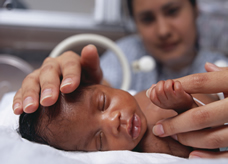In this article, you will find:
Neonatal intensive care unit
There are many reasons why your baby may need special care, the most common one being prematurity (being born before 37 weeks). Babies may need to spend days, weeks, or sometimes months in a NICU until they are big enough and well enough to go home.
If your baby is in a NICU, this is a particularly stressful time. It helps to understand a bit about who will be caring for your baby, what they will be doing, and how to make sure you're fully informed at all times.
In the US, most hospitals have a unit to provide special nursing and medical care for babies; these are divided into three levels depending on the degree of care offered. Level one is the most basic level. These units don't provide long-term ventilatory support, but they are expert at caring for babies who are slightly premature, need frequent nursing, or have previously been ventilated and are ready to be transferred to less intensive care. Level two units ventilate and give intensive care to babies from 26 weeks' gestation. Level three units offer intensive care for babies born as early as 23 weeks, and can often do neonatal surgery.
All these units are staffed by special nurses and doctors who will be happy to show you around before the baby is born if there is time.
Ward rounds
Most units have rounds each morning, and the more intensive units will have another round later in the day. Some allow parents to be present and to ask questions during rounds, while others prefer parents to wait outside and then make time to talk to them afterward.
Communication and visiting
You may be able to spend some time with your baby before he is sent to a NICU. However, if your baby needs to be on a ventilator, or has another serious problem, he will be sent immediately to neonatal intensive care, and you may not have any time together after the birth. You'll be encouraged to see your baby as soon as he has been transferred, and if you're unable to go immediately, you may be given a photo of your baby.
You should be able to see your baby any time of the day or night and the nurses will be happy to update you regularly. The doctors will also give you an update on an ad hoc basis or arrange to meet you for a more formal chat. Other family members may be able to visit the unit with your permission.
While your baby is in the NICU, he may be treated with medication and have various tests and checkups. In some cases, he will need to be on a ventilator.
Tests and X-rays
Your baby may have blood tests to check for infection and anemia, to check kidney function, oxygen, and carbon dioxide levels, sugar levels, and to identify his blood group. The frequency of these depends on how ill or premature your baby is. In neonatal intensive care babies need blood tests periodically. Some babies need an X-ray while they're there, and very premature babies often need many chest X-rays and sometimes abdominal ones.
Who's who on the neonatal unit
Neonatal nurses
Most of the care in a neonatal intensive care unit is carried out by highly trained nurses. These include registered nurses and neonatal clinical nurse specialists who have advanced training. Some intensive care units also have neonatal nurse practitioners, who have advanced education and training and can perform many procedures.
Doctors
Neonatologists are the doctors who run the neonatal intensive care units. These are the doctors who will coordinate your baby's daily care plan. They are pediatricians who have received advanced training to care for sick and premature newborns. The neonatologist in charge of the department is known as the attending doctor. In addition to neonatologists, there are often neonatology fellows and pediatric residents, as well. Neonatology fellows are pediatricians who are getting advanced training to care for sick newborns. Pediatric residents are doctors who are being trained in the specialty area of pediatrics.
Other members of staff
A neonatal intensive care unit depends on a number of other staff members. These include a registered dietitian, physical and occupational therapists, technicians (who can draw blood or take X-rays), pharmacists, and, in some neonatal intensive care units, a psychotherapist to offer much needed emotional support to parents.

Carrying your baby close to your body and enjoying skin-to-skin contact together will help your tiny baby thrive.
